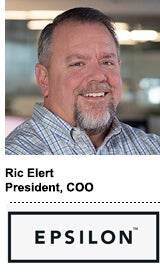Epsilon is helping clients prepare for the new world of digital marketing that will follow after the deprecation of third-party cookies in Chrome and IDFA on Apple devices.
While Epsilon’s ID graph still uses cookies and mobile ad IDs while they’re available, its CORE ID relies on deterministic matches against transactions and conversions, such as logins or form sign-ups, from vetted data partners to enable people-based advertising in a cookieless world.
That strategy has allowed Epsilon to maintain a 12% match rate on Safari, where “most folks are seeing 1% to 2%,” said Ric Elert, president and chief operating officer at Epsilon.
“We have tremendous scale flowing through us on a daily basis that allows us to keep that match strong,” he said.
Since joining Publicis Groupe last year, Epsilon has been at the center of the group’s product strategy. Epsilon has enabled the CORE ID in audience planning tool Publicis People Cloud and is consolidating different workstreams across the group into cohesive products.
“There were 13 dynamic creative optimization initiatives across Publicis,” Elert said. “We’re consolidating those and centralizing the product strategy.”
Epsilon is also focused on helping clients understand their customers as needs and habits change during the COVID-19 pandemic. The United States-based company is expanding into Europe and Asia later this year and launching in Latin America in 2021.
Elert spoke with AdExchanger.
AdExchanger: What’s the value of the CORE ID?
RIC ELERT: Clients understand the customer in the context of their brand, but they want a true picture of the individual – what they’re reading, purchasing and spending time on. Epsilon can provide that.
The CORE ID allows clients to better understand how spend overlaps between media partners. How many impressions are you driving against an individual? Clients can reinvest those savings into higher performing operations.
It also opens up more data to activate against, both internally and with third parties. We’re creating deeper partnerships with DSPs, DMPs and CDPs to [access] the ID because of its longevity post-third-party cookies.
How will the CORE ID be impacted by the deprecation of third-party cookies and IDFA?
We’re going to see maybe 8% to 10% degradation when third-party cookies go away. Others will take a three to four times hit because they’re relying on sync rates with third parties and they don’t have enough scale.
If I see you on a publisher site once a day, I’m not going to be able to maintain activity with you. But I if see you thousands of times a day on different sites, I can maintain stability.
How are you matching data in a privacy compliant way?
We are pushing for consent, tracking opt-outs and making sure the user understands what’s going on. We’re seeing very low opt-outs with GDPR. With CCPA, we’re seeing people request the data we have on them. We verify those and send back the data.
If you’re open and direct with users, they are fine with [targeting] if they are getting value. Being open with people keeps us out of trouble. We won’t work with data sources that don’t have opt-in or consent. We’re consistently audited by third parties to make sure everything about the process is respectful of consumer identity, as well as client first-party data.
What’s the future of third-party data?
I think it’s going to be very limited. Data [privacy] has caught the eye of the legal community. People who are going for consent and providing a value exchange will thrive, and the ones that aren’t will have problems.
My concern is that third-party cookie degradation limits the ability for the little company to break out and shine. There’s no secret that cookie deprecation is a walled garden protective play. They’re trying to limit competition. We’re trying to make sure our clients have open and clearly visible access to data and the performance it’s yielding.
Will Epsilon continue to operate its third-party data marketplace?
We’ll keep our marketplace because clients use it. I’m sure it will go through transformations, but we’ll continue to drive forward.
Does Epsilon mostly work with its own clients or Publicis clients?
Epsilon still maintains 80% to 90% of our clients outside the group. We’re growing our organic channels. We have a stable of clients at Publicis that is going to continue to grow.
We have to maintain collaboration with the group, but also independence so we don’t have Stockholm syndrome. A lot of our clients use agencies [outside of Publicis].
How has Epsilon’s value prop changed during the COVID-19 pandemic?
There’s been a big push around direct-to-consumer. We’re tying the CORE ID with consulting at Sapient to deliver loyalty and in-app solutions. That’s been huge in the restaurant vertical. We [created] new ad units where a person can click the ad and it will call the location closest to them for in-store or curbside pick-up.
Hotel chains are trying to get into the VRBO market. We’re connecting CPGs with stores carrying them for curbside [pickup] or home delivery. And we’re working with retailers to create media networks, which is a new source of revenue for Epsilon.
People are moving around a ton, so we’re making sure the messages they’re seeing are relevant.
This interview has been edited and condensed.













